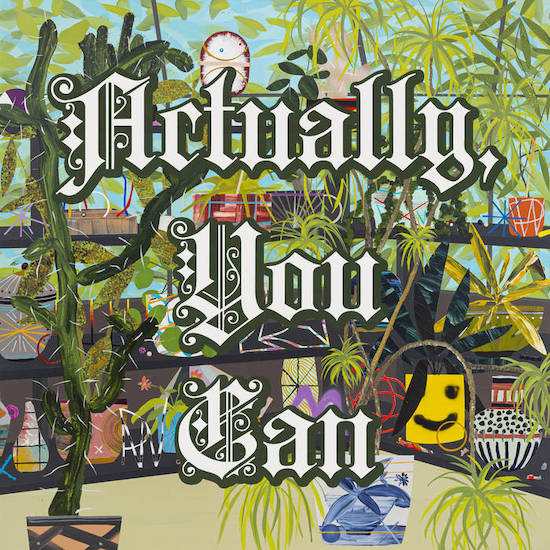Deerhoof is hurtling closer and closer to doomsday: 2020’s concept album Future Teenage Cave Artists was abstractly apocalyptic, circling around the advent of violent societal collapse. This year, Actually, You Can pursues the same motif – but it returns with a far more ornamental approach to catastrophe. With its titular breezy, Yoko Ono-esque assertion of positivity, and a more streamlined frivolity, the newest Deerhoof LP delivers the group’s classic 00s noise pop sound beneath a cheery spectre of doom.
Swirling with whimsy, Actually, You Can returns to a lighter, The Runners Four sound compared to the more anxious experimentation of the band’s recent discography. Some Deerhoof constants remain: despite the greater lyrical focus on philosophy, Matsuzaki trills an ample amount of carefree nonsense. The stage is set for the record with the opening query, “If we have only planted onions, how are these tomatoes all growing?”
More cogent scenes of excess trot out the lyricism: she sings, “There will be dancing, simulated dancing” and “there will be crying, artificial crying” and “there will be prayer, imitation prayer” on ‘Our Philosophy is Fiction’, her signature high register imbuing a disquieting dimension to the words. The tracklist – rounded out with titles like ‘Scarcity is Manufactured’ and the anti-carceral ‘Department of Corrections’ – begins to sound like a collage of Boot Boyz Biz slogans.
There’s a great deal of catchiness to the parts of John Dieterich and Ed Rodriguez, as well. Single ‘Scarcity is Manufactured’ opens brightly and near-dissonantly, carried by some of Deerhoof’s catchiest guitar lines yet, rivalling the backbones of ‘Spirit Ditties Of No Tone’ and ‘Your Dystopic Creation Doesn’t Fear You’.
Post-pandemic Deerhoof has enjoyed a fairly prolific output, but the band occasionally veers into danger of needing to take a breather. They don’t emphasize ideas explored on the often exhausting sprawl of 2020’s Love-Lore, but a similar stasis plagues the annals of Actually, You Can. Tracks like ‘Epic Love Poem’ and ‘We Grew, and We Are Astonished’ stagnate, lumbering into an uninteresting dissonance as even Matsuzaki’s musings appear to run out of meaning. But the otherwise operatic attempt at a purer noise pop succeeds; the record chiefly resounds with colour and depth.
It’s closer ‘Divine Comedy’ that ties the album’s concept together. Softly, Matsuzaki reflects on the nature of her own songwriting within late-stage capitalism: “Match your breath to the singer’s breath / but she’s selling you a cigarette to breathe through,” she warns, before the rest of the band launch into a beautiful, quick-paced deconstruction. Actually, You Can might tumble headfirst into doomsday, but Deerhoof’s day of reckoning sounds just as botanical and prismatic and baroque as they proclaim.


